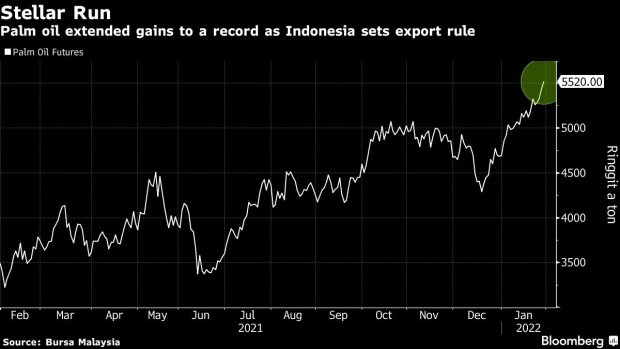Jan 28, 2022
Indonesia’s Palm Oil Exports to Ease Only Slightly Despite Curbs
, Bloomberg News

(Bloomberg) -- Indonesia’s palm oil exports may drop by just 1 million tons this year, according to a top industry group, a sign that the government’s latest policy to cool prices will not significantly crimp overseas shipments.
Exports by the top oil palm grower could fall 3% to 33.2 million tons this year, said the Indonesian Palm Oil Association, known as Gapki. That’s because its consumption of the tropical oil for food and biodiesel is expected to rise.
While the forecast doesn’t yet take into account the latest export rule that requires companies to allocate 20% of shipments to the local market, Gapki said it doesn’t expect the policy to affect overseas volumes.
“The policy may disrupt exports in February but total exports may not decline much,” Togar Sitanggang, vice chairman of Gapki, said by phone. By March, exporters would have adjusted their volumes to comply with the rule, he said.
Palm oil, the world’s most consumed edible oil, extended a surge to a fresh record after Indonesia announced the policy on Thursday. Prices have climbed about 60% in the past year, driven by a severe labor crunch in Malaysia, the second-biggest grower, as well as tight vegetable oil supplies globally.
Gapki estimates that domestic consumption of palm oil will rise 12% this year to 20.6 million tons. This includes 8.8 million tons for its biodiesel mandate.
Local demand for cooking oil will be at 5.7 million kiloliters this year, which may require about 8 million tons of crude palm oil, Sitanggang said.
Indonesia produced 47 million tons of crude palm oil last year, of which 2.7 million was exported. The country ships mostly processed palm oil. Crude palm oil output may grow 4.5% this year to 49 million tons, Gapki predicts.
©2022 Bloomberg L.P.


